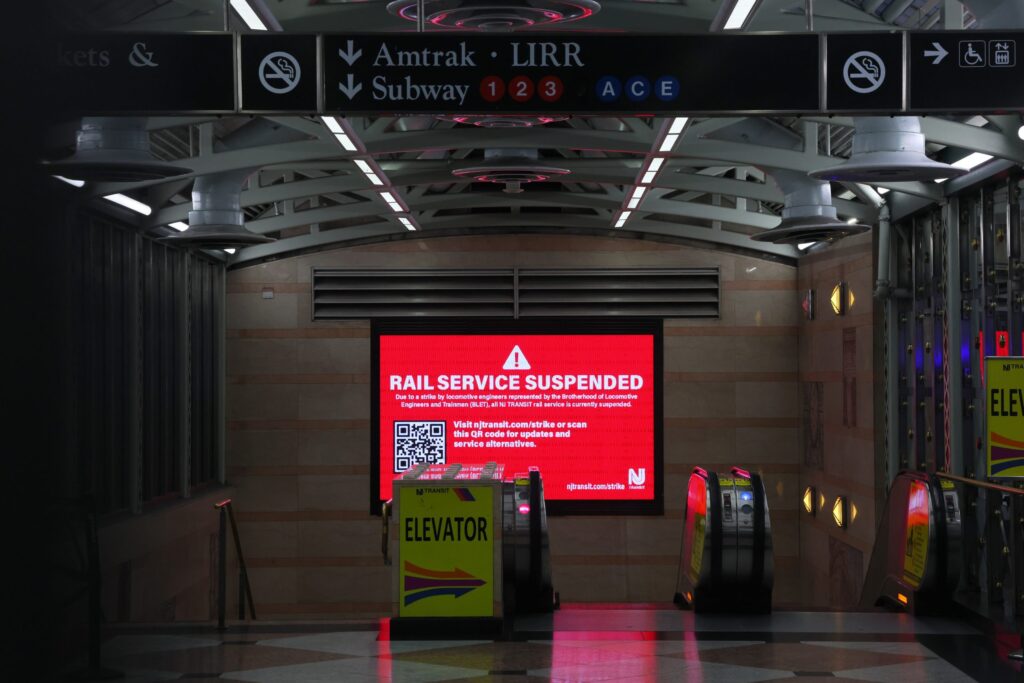New Jersey Transit (NJ Transit) train engineers went on strike Friday, leaving as many as 350,000 commuters without running trains.
NJ Transit created a contingency plan in response to the strike, according to a notice released by NJ Transit. It focused its available resources on transporting over 70,000 commuters headed for New York, increasing capacity on bus routes to New York and using the regional Park & Ride service.
NJ Transit estimated that, even with these changes, it would only be able to transport about 20% of its regular rail customers. Multiple outlets reported that as many as 350,000 people use the rail system each day.
NJ Transit’s notice encouraged “all those who can work from home to do so and limit traveling on the NJ Transit system to essential purposes only.”
NEW YORK, NEW YORK – MAY 16: A “Rail Service Suspended” message is displayed in the NJ Transit station at Penn Station on May 16, 2025 in New York, New York. About 450 members of the Brotherhood of Locomotive Engineers and Trainmen walked off the job after talks with NJ Transit broke down over pay. The strike, NJ Transit’s first in over 40 years, has disrupted travel for roughly 350,000 commuters across New Jersey and New York City, forcing many to find alternative routes or stay home altogether. (Photo by Michael M. Santiago/Getty Images)
The Brotherhood of Locomotive Engineers and Trainmen (BLET), which represents the train engineers, initiated the strike after discussions of a new arrangement since 2019 ended inconclusively Thursday following 15 hours of contract talks, according to a statement by the BLET. (RELATED: EXCLUSIVE: GOP Unveils Bill To End Taxpayer-Funded Union Organizing)
The BLET claimed NJ Transit managers walked out of the talks just prior to 10 p.m. and “forced a strike despite the transit agency having the funds for a raise.”
However, Democratic New Jersey Gov. Phil Murphy and NJ Transit CEO Kris Kolluri said blame for the strike falls on BLET, according to the New Jersey Monitor. They claimed the union called for salary increases they would have end up providing to NJ Transit’s other unions, leading to bankruptcy. Union leaders said their wages were far below what other railroads paid their engineers.
Kolluri signaled that NJ Transit was still open to negotiations.
“If they’re willing to meet tonight, I’ll meet them again tonight. If they want to meet tomorrow morning, I’ll do it again because I think this is an imminently workable problem,” he said. “The question is, do they have the willingness to come to a solution.”
Kolluri previously told the New Jersey Monitor that an average NJ Transit engineer earns an annual salary of $135,000. Managers and union leaders reached a preliminary agreement in March to increase pay to $172,000 but the union voted to reject the proposal in April.
NJ Transit is willing to increase the wages by 23% over the next seven years to match the wages negotiated with its 14 other unions, while BLET is looking to negotiate a 66.2% raise over the next 10 years, the outlet reported. Kolluri said that if NJ Transit met the union’s demands, they would need to extend the raise to all of their other unions based on contractual obligations. Murphy said this would represent at least a $100 cost to the agency.
“NJT’s engineers make at least $10 less per hour than engineers who work for passenger railroads that share the same train platforms as NJ Transit,” BLET’s statement read.
“NJ Transit has a half-billion dollars for a swanky new headquarters and $53 million for decorating the interior of that unnecessary building,” said Mark Wallace, national president of the BLET.

NEWARK, NEW JERSEY – MAY 16: James P. Louis Vice President of the Brotherhood of Locomotive Engineers and Trainmen speaks to members of the media as they take part during a Strike outside NJ Transit’s Headquarters on May 16, 2025 in Newark, New Jersey. (Photo by Kena Betancur/Getty Images)
“They have money for penthouse views and pet projects, just not for their front-line workers. Enough is enough. We will stay out until our members receive the fair pay that they deserve,” Wallace said.
The BLET is a division of the International Brotherhood of Teamsters, a large union representing approximately 1.3 million members.
“New Jersey Transit could have avoided this strike, but they blew it,” said Teamsters General President Sean M. O’Brien in a statement.
O’Brien claimed his union was “low-balled and disrespected.”
The strike could continue for days or even weeks unless the parties can reach a compromise or Congress steps in to end the strike using the Railway Labor Act of 1926.


